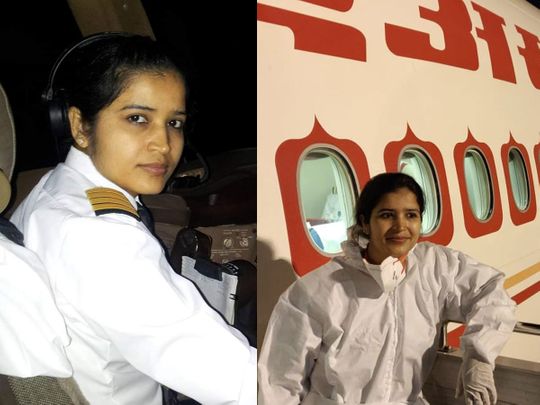
When Delhi-based Air India pilot Swati Raval, received a call from her team, on March 20, asking if she would be able to operate a rescue flight from Rome, to bring back 263 stranded Indians, only one thought came to her mind – her children.
There was not much time to reply, India’s second rescue mission plane would fly the very next day, to evacuate Indian citizens stuck in Italy, which then was at the centre of the coronavirus pandemic.
Speaking to Gulf News, Raval, who reportedly became the first Indian female civil pilot to have undertaken a rescue mission during the COVID-19 pandemic, recalled: “All I could think of was my five-year-old son and my 18-month-old daughter. She had fallen sick just a few months back, while I was flying. In a matter of minutes, several questions came to mind, what if I get infected? Plus, I would be required to go into quarantine on return. How would I stay away from my children? But, I knew this was an opportunity for me to serve my country, and help my people. It was not just my job, but my duty.”
The 40-year-old, who always wanted to become a fighter pilot to serve the country, but didn’t get the chance, saw the rescue mission as her life’s purpose, and agreed. On March 21, after kissing her family goodbye she headed to Delhi’s Indira Gandhi International airport, slightly nervous.
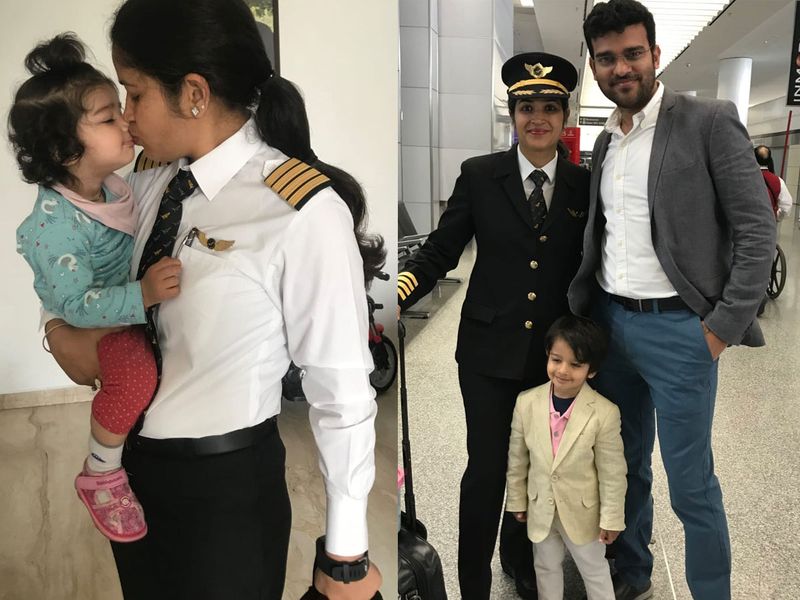
Airport felt different
Once she reached, it was time for safety procedures. “We were 24 crew members. Our temperatures were taken, we were given all the required safety gear, and Personal Protective Equipment (PPE). The world was still newly learning about how to deal with coronavirus, and what measures to take."
Raval who joined aviation training in 1999, and got her license in 2002, said that for the first time, the airport felt different. “I can’t forget how different the airport seemed. I was sitting in the cockpit, the airport looked so gloomy, there was no movement on the runway, and aircrafts were parked. The usual lively airport atmosphere was missing. No one was talking,” she said.
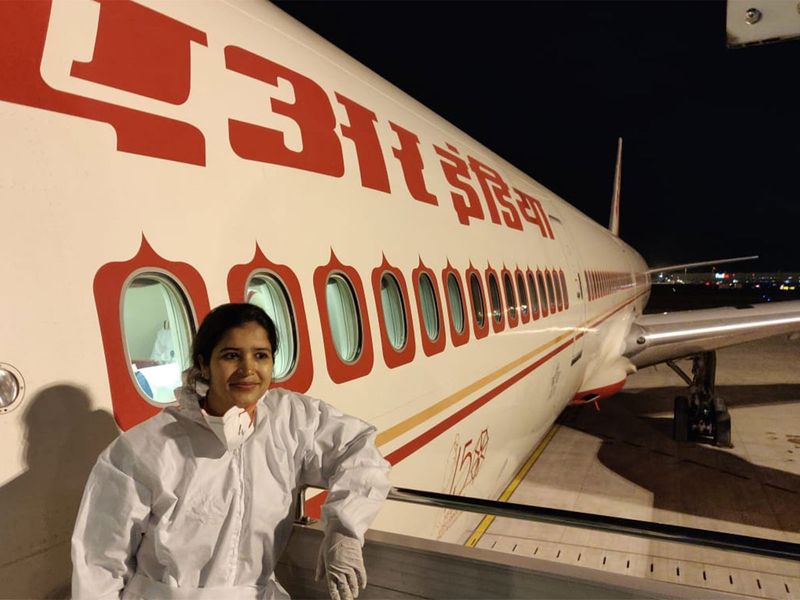
Going to Rome, it was Captain Raja Chauhan who flew the Air India Boeing 777. “There was an uncanny silence as I sat behind with the rest of the crew, the whole plane was empty,” added Raval, who has completed over 5000 hours of flying.
Next day, March 22, the flight touched down in Rome.
“Once we were there, Captain Chauhan, who is one of my mentors in Air India, told me, ‘now the cockpit is yours, to fly us back’.”
Passengers were eager to return
For safety issues, pilots are asked to maintain minimum contact with passengers, even during regular flights. Keeping the spread of COVID-19 in mind, the crew, especially the pilots, did not interact with passengers at all. But, they could see the passengers as they boarded the plane.
“I was watching as the passengers walked in, it was such an emotional moment. I saw their faces, they looked so relieved. One of the evacuees was an acquaintance of a first officer on board. And, in a message, she had written, ‘Never thought a flight back home, would mean so much’. When I read that, all the effort we took felt worth it. It felt more than a job assignment. They needed us.”
Raval said, all the passengers followed strict guidelines. “We had an amazing crew, who kept ensuring everything was alright, and the mission carried out with utmost safety of the passengers. Throughout the eight hour flight, no one talked much.”
When the plane landed back in Delhi airport, the crew were first asked to exit, and were taken to an isolation area. “Ground staff wearing PPEs or protection kits and carrying huge disinfection spray equipment, cleaned us.”
“Frontline corona warriors have often expressed how difficult it is to wear PPEs for long hours.
Raval said: “Hats off to the doctors who wear these and more safety gear for hours on end, just the 16-hour trip in a PPE was quite uncomfortable. Though the material is thin, it gets warm inside, with the clothes you are wearing.”
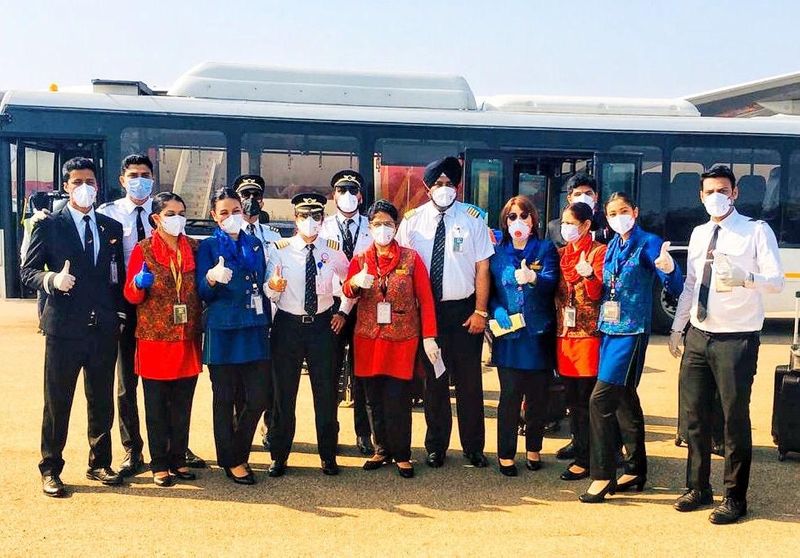
After a successful touchdown, the crew clicked pictures together, and headed back home. Raval was ecstatic to return to her south Delhi home.
At home, no warm welcome hugs
But, for the first time, returning home was different. There were no warm welcome hugs, safety was more important. “When my son ran to hug me, as I entered, I had to stop him and tell him, ‘Mum can’t hug you’. For two days I avoided appearing in front of my daughter, but when she saw me she made her way towards me with a huge grin – she cried as her walk was interrupted by my husband, who took her away. It broke my heart. I had to isolate myself for two weeks before I could finally interact with my children. That was the toughest part. My daughter would try to sneak to my door, when no one was watching, and laugh mischievously when someone would spot her. When I finally got to hold my kids, I felt the longing that people affected by this pandemic must be feeling. To see, or hold or interact with family.”
She calls her husband Ajit Kumar Bhardwaj her pillar of strength, and said: “Without him, it would be impossible for me to reach the heights I do. He helps me take care of the children, every time I have my flight, we adjust our schedules to ensure one of us is always with the children.”
Becoming a pilot
Raval joined Air India in 2004. But, it did not all come so easily to her. Born and educated in Gujarat, she studied in a Gujarati medium school. So, when she applied for flight training, Raval struggled with the English language initially. “I had to work three or four times harder than my fellow trainees, to be at par,” she said.
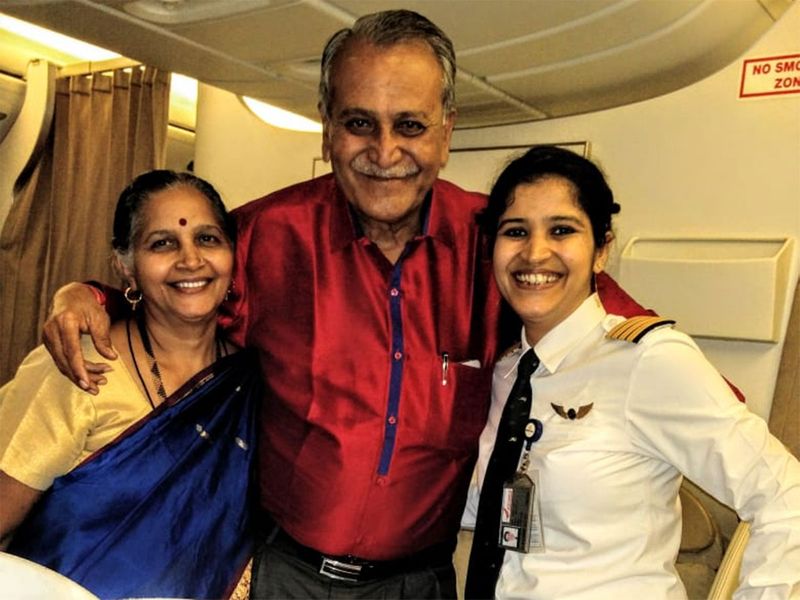
She recalled how she went on to complete her training, and one of her best flying moments was when she took her mother along, on a plane she was piloting. Her father said, he would join her when she flew a bigger aircraft. When he finally did, a few years later, she said: “I still remember his eyes got misty. He has always supported me, and I have never faced discrimination for being a girl.”
Finally, in 2013, she became a commander on a Boeing 777.
After returning from Rome, Raval was congratulated by many prominent leaders including Indian Prime Minister Narendra Modi, on achieving the feat.
She said, she would happily do as many flights as needed, to bring her compatriots back home. And says: “If there is one thing we need to learn from the pandemic, it is to stop being selfish, and keep humanity first.”








